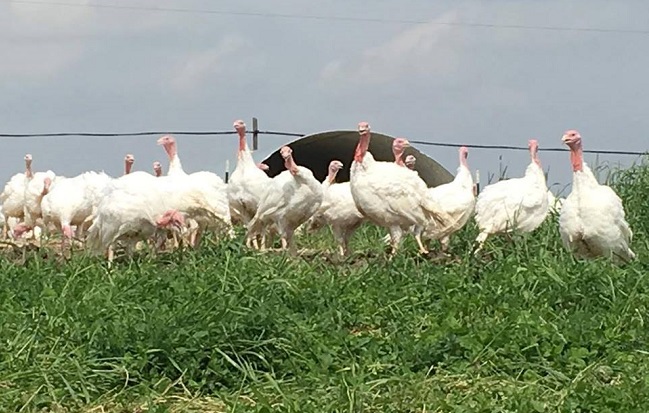October 21, 2017 – Keeping Food Slow
![]() I don’t always have time to visit the Logan Square Farmers Market in my neighborhood in Chicago when it’s open on Sunday afternoons during the growing season. That’s because I’m often doing work for some darned radio show that sucks up a ridiculous amount of my precious time. But when I do stop by, I always make a point to visit the booth that has the Cedar Valley Sustainable Farm sign. That’s because 1) my friends Beth and Jody Osmund work there, and 2) if I purchase a meat product, I know that it was raised and produced humanely for my consumption.
I don’t always have time to visit the Logan Square Farmers Market in my neighborhood in Chicago when it’s open on Sunday afternoons during the growing season. That’s because I’m often doing work for some darned radio show that sucks up a ridiculous amount of my precious time. But when I do stop by, I always make a point to visit the booth that has the Cedar Valley Sustainable Farm sign. That’s because 1) my friends Beth and Jody Osmund work there, and 2) if I purchase a meat product, I know that it was raised and produced humanely for my consumption.
Unlike my co-host Peggy, I am an omnivore. But I try to be a conscientious omnivore, which is why I’m happy that the Osmunds have their farm. As they say on their website, “We didn’t become farmers because we are Local Foods activists. We became activists because we are farmers making our living from local foods.”
They are also advocates of something called Slow Food, which is now about 30 years old and is
a global, grassroots organization, founded in 1989 to prevent the disappearance of local food cultures and traditions, counteract the rise of fast life and combat people’s dwindling interest in the food they eat, where it comes from and how our food choices affect the world around us. Since its beginnings, Slow Food has grown into a global movement involving millions of people in over 160 countries, working to ensure everyone has access to good, clean and fair food. There are over 150 chapters in the USA.
Jody is a board member of Slow Food Chicago, and his short biography on their page explains how he came to be a part of the sustainable agriculture movement:
Jody grew up on a diverse conventional commodity farm – grains, hay, hoys, cattle, and horses. The farm crisis of the late 80’s pushed him toward a professional career off the farm. Fifteen years later, he and his young family moved back to the farm and started the first Community Supported Agriculture (CSA) enterprise in the area. Jody continues to operate Cedar Valley Sustainable Farm’s Meat CSA today. He has grown into a local foods leader – serving on food policy councils and starting a non-profit to raise awareness of CSA’s in the Chicago area. Slow Food’s “Slow Meat” initiative has become a focus over the past three years, attending the Denver conference in 2014 + 2015.
In 2016, he traveled to Turin, Italy for Terra Madre, which is an organization that brings together players in the food chain across 150 countries who support sustainable agriculture, fishing, and breeding with the goal of preserving taste and biodiversity. At that meeting, he served on a Slow Meat panel with delegates from around the world.
This summer, Jody attended Slow Food Nations in Denver to be on a panel discussing corporate consolidation in the meat industry (a handful of companies control the vast majority of the global trade) and how to fight it. He says that while he was there he attended a panel on immigrant rights and the food industry, and he notes that many immigrants and refugees are exploited throughout the American food industry.
And now they have a new concern–the threat, under the Trump administration, of being deported. To some degree, it is already affecting the food industry in America.
In Los Banos, California, asparagus farmer Joe Del Bosque said workers are so afraid of being arrested in the field that he struggled to find enough hands in March to pick his crop.
When immigration attorney Sarah Loftin held a recent seminar in the Oregon wine-region town of Newberg to talk about immigrants’ legal rights, she was surprised to see about half of those present were winery owners or farmers.
By law, job seekers must provide documents establishing their eligibility to work in the U.S. But the papers are often fake. Many agricultural employers say that it’s not their responsibility — and that they lack the expertise — to determine if they’re genuine.
At the same time, they say that U.S.-born workers have little interest at laboring in the dirt and the cold at the crack of dawn.w
Jody tell us that a farmer friend of his, John Breslin, who is a retired prosecutor, is working on immigration law and plans to provide legal services to women and children immigrants/asylum seekers at a detention center in Texas. Jody is working to connect him to a fluent Spanish speaker for translation.
Closer to home, Cedar Valley is teaming with Gunthorp Farms this fall to provide fresh, pasture-raised turkeys to the public just in time for the Thanksgiving holiday. And I would be remiss if I didn’t mention that Jody is one of the founding members of Band of Farmers, which we have talked about on the show many times.
It’s a pleasure to welcome Jody Osmund back to The Mike Nowak Show this morning.

